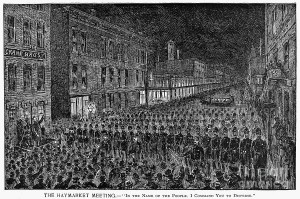S. follows Sola whom he learns is named Szalómé (a name of Hungarian origin). S. feels an inexplicable, forced attachment to this woman and follows her down the street. Ostrero and Pfeifer are suspicious of S. as he flees while the tension in the crowd rises.

S. sees Sola amidst a crowd about to break into a riot (based on the Haymarket Square Incident, pictured above).
S.’s thought process provides insight into his character. He has no doubt that Sola is Szalómé, and, more importantly, that she is of any significance to his life. “He’d bet everything that his old, unremembered self might have owned that they’re speaking of the same woman.” Indeed, each time he loses sight of her he panics. The act of chasing a stranger makes S. an impulsive character with faith in the universe. Instead of pessimistically denying the feeling that Sola gives him, he responds to his emotions and makes an effort to satisfy them.
Jen believes S. is “SO completely chasing after love.” Eric disagrees with this interpretation. Throughout the novel, Jen tends to interpret the story as love and Eric does not, conforming to gender stereotypes. This exchange also philosophically explores the meaning of love. S. tries to “find the person who may know who he is.” Jen believes that need is synonymous with love.
Eric gets anxious when Jen has not responded in a while, revealing that he keeps tabs on their communication. Jen shuts him down with a hint of hysteria and Eric apologizes earnestly and out of confusion (again, an exchange that promotes gender stereotypes). In the green-and-yellow time period, Eric points out that she did not treat him well, and Jen responds with a moment of vulnerability. This exchange is part of a recurring pattern: the two point out each other’s flaws and reconcile by sharing. Jen also says that the “new Jen project fell apart” revealing the difficulty that expectations and identity construction pose.


You must be logged in to post a comment.